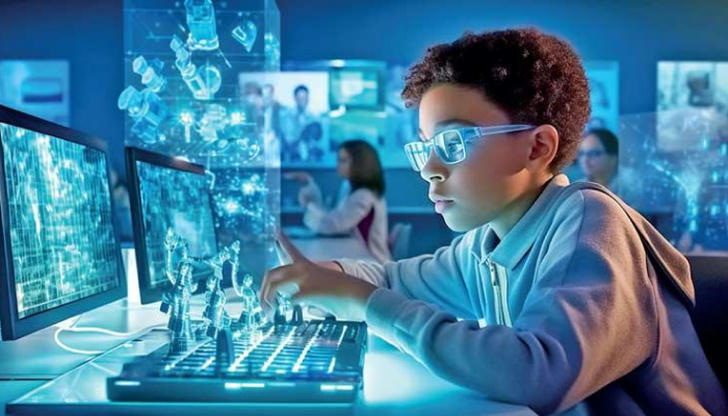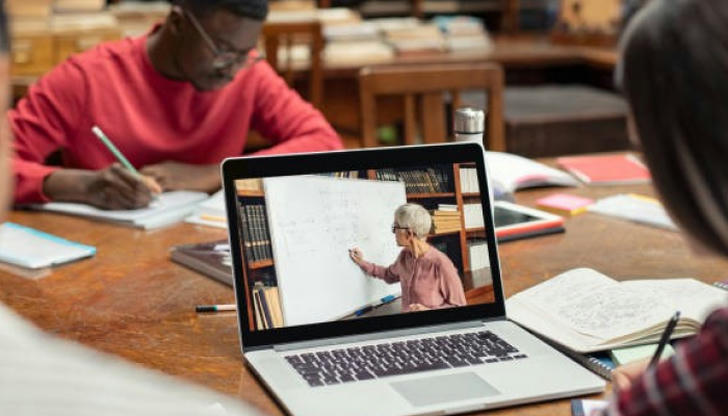Future of Education: Embracing Innovation in the 21st Century

Education has always been a driving force behind personal growth, societal advancement, and the creation of new opportunities. In the 21st century, however, the landscape of education is undergoing a significant transformation. Advancements in technology, changes in societal needs, and a growing focus on lifelong learning are reshaping how we educate and learn. The future of education promises to be more inclusive, flexible, and personalized, with a strong emphasis on innovation to prepare students for an increasingly complex and interconnected world. This article explores the key trends, challenges, and opportunities shaping the future of education.
The Role of Technology in Shaping Education

One of the most prominent factors influencing the future of education is technology. Digital tools have already revolutionized classrooms, but the full potential of technology in education is only beginning to be realized. As we look toward the future, the role of technology in education will become even more significant, reshaping the way content is delivered, how students engage with material, and how educators interact with learners. Online Learning and Virtual Classrooms The rapid rise of online learning platforms has fundamentally changed how education is delivered. Today, students can take courses from prestigious institutions without ever leaving their homes, thanks to platforms like Coursera, edX, and Khan Academy. With the ongoing evolution of technology, this trend will continue to expand, making education more accessible and inclusive. In the future, virtual classrooms will likely become more immersive, using tools such as virtual reality (VR) and augmented reality (AR) to create interactive and dynamic learning experiences. For example, students could use VR to take virtual field trips, conduct lab experiments, or explore historical events, all from the comfort of their homes. This type of learning is particularly beneficial for students in rural or underserved regions who might not have access to physical educational resources. Artificial Intelligence and Personalized Learning Another technological innovation that will shape the future of education is artificial intelligence (AI). AI has the potential to revolutionize education by providing personalized learning experiences tailored to the needs and learning styles of individual students. AI-powered platforms can analyze student performance and provide real-time feedback, ensuring that each student receives the appropriate level of challenge and support. For example, adaptive learning technologies can adjust the difficulty of assignments or lessons based on how well a student is performing, offering additional resources if needed or speeding up the pace for advanced learners. This type of personalized learning helps ensure that no student is left behind, and every learner can progress at their own pace. AI can also assist teachers by automating administrative tasks such as grading, attendance tracking, and organizing lesson plans, allowing them to focus more on student engagement and interaction. Furthermore, AI-powered chatbots and tutors could provide additional support to students, answering questions or guiding them through difficult concepts. Gamification in Education Gamification, or the use of game-like elements in non-game contexts, is another trend that is gaining traction in education. By incorporating elements like rewards, challenges, and progress tracking into learning environments, educators can make learning more engaging, motivating, and enjoyable. Research has shown that gamification can significantly improve student engagement, particularly for subjects that students often find difficult or boring. In the future, we can expect more widespread use of gamification in both K-12 and higher education. For instance, students might complete assignments or exams in the form of games, earning points, badges, or virtual currency for achieving milestones or mastering new skills. This approach taps into students' intrinsic motivation and encourages active participation in the learning process.
Inclusive Education: Embracing Diversity and Equity

As the world becomes more interconnected, there is an increasing demand for inclusive education that caters to a diverse range of learners. The future of education will need to accommodate students from different cultural backgrounds, socioeconomic statuses, and learning abilities. Universal Access to Education While significant progress has been made in expanding access to education, there are still millions of children and adults who lack access to quality education. According to the UNESCO Institute for Statistics, approximately 258 million children and youth worldwide are out of school, and many more face barriers to education due to factors like poverty, gender discrimination, and conflict. The future of education must prioritize inclusivity and work towards achieving universal access to quality learning opportunities. This includes providing resources to underserved communities, ensuring that marginalized groups such as girls and children with disabilities can attend school, and making education affordable and accessible through the use of technology. Special Education and Support for Diverse Learners Another important aspect of inclusive education is supporting students with disabilities or special needs. Advances in assistive technology, such as text-to-speech software, screen readers, and voice recognition tools, have made it easier for students with physical and cognitive disabilities to access learning materials. In the future, we can expect these technologies to become more advanced, providing even more tailored support for students with a range of disabilities. Furthermore, Universal Design for Learning (UDL), a framework that promotes flexible learning environments to meet the diverse needs of all students, is likely to become a standard approach in classrooms around the world. UDL encourages educators to provide multiple means of representation, engagement, and expression, ensuring that every student has an equal opportunity to succeed.
Lifelong Learning and Continuous Skill Development

In an increasingly dynamic world, learning should not be limited to childhood or adolescence. As the nature of work changes due to automation and technological advancements, there is a growing emphasis on lifelong learning and continuous skill development. The future of education will need to adapt to the demands of a rapidly changing job market by offering flexible and accessible opportunities for people to learn new skills throughout their careers. The Gig Economy and Micro-Credentials The rise of the gig economy has altered the traditional career trajectory, with many people now working as freelancers or in non-traditional roles. As a result, there is a growing need for short, flexible learning programs that allow individuals to upskill or reskill quickly. Micro-credentials, or digital badges and certificates that recognize specific skills or achievements, are expected to play a significant role in the future of education. These bite-sized qualifications can be earned through online courses, workshops, or on-the-job training and provide a more affordable and accessible way for individuals to demonstrate their expertise. Corporate and Workforce Education In addition to individual learners, corporations and organizations will play a critical role in fostering lifelong learning. As industries evolve, companies will need to invest in the ongoing development of their workforce to ensure that employees have the skills necessary to adapt to new technologies and business models. Employers may partner with universities, vocational schools, and online platforms to offer training programs, apprenticeships, and certification opportunities to their employees. By creating a culture of continuous learning, organizations can stay competitive and ensure that their workers remain adaptable and resilient in the face of change.
The Role of Teachers in the Future of Education
While technology will play a major role in shaping the future of education, the importance of teachers cannot be overstated. In fact, the role of educators will likely evolve to focus more on mentorship, coaching, and facilitating learning rather than delivering traditional lectures. Teachers will need to be equipped with new skills to integrate technology into their teaching practices effectively, while also fostering critical thinking, creativity, and emotional intelligence in their students. The Evolving Teacher-Student Relationship In the future, the teacher-student relationship will likely be more collaborative than hierarchical. Educators will act as guides, helping students navigate the vast amount of information available online and encouraging them to think critically about what they learn. With the increasing use of AI and personalized learning tools, teachers will have more time to focus on building strong relationships with their students, addressing their emotional and social needs, and providing individualized support. Teachers will also play a central role in ensuring that students develop the 21st-century skills necessary to thrive in a complex, interconnected world. These include creativity, problem-solving, teamwork, and communication—all of which cannot be easily taught through traditional rote learning methods but require active engagement, collaboration, and real-world experiences.
Challenges and Considerations for the Future of Education
Despite the promising potential of innovation in education, several challenges must be addressed in order to ensure that the future of education is equitable, accessible, and effective for all. Addressing the Digital Divide One of the most pressing issues is the digital divide, which refers to the gap between those who have access to technology and those who do not. While many students in developed countries have access to high-speed internet, computers, and digital tools, millions of students in low-income communities or developing countries are still without these essential resources. Closing the digital divide is critical for ensuring that all students have equal opportunities to benefit from technological advancements in education. Data Privacy and Security As more education platforms collect data on student performance, interests, and behaviors, there are growing concerns about data privacy and security. Schools, universities, and education tech companies will need to implement robust security measures and ensure that student data is protected from breaches or misuse. Additionally, clear ethical guidelines must be established to govern the use of student data, particularly in AI-driven learning systems. Cultural and Societal Barriers to Change Finally, cultural and societal attitudes toward education will need to evolve in order to fully embrace the changes brought about by innovation. Many educational systems, particularly in traditional societies, are slow to adapt to new technologies and pedagogical approaches. Overcoming resistance to change and fostering a mindset of innovation among educators, parents, and policymakers will be essential for achieving the vision of a modern, inclusive, and dynamic educational system.
Conclusion
The future of education is undoubtedly exciting, offering new opportunities for personalized learning, global connectivity, and lifelong skill development. However, realizing this future will require addressing the challenges of digital
